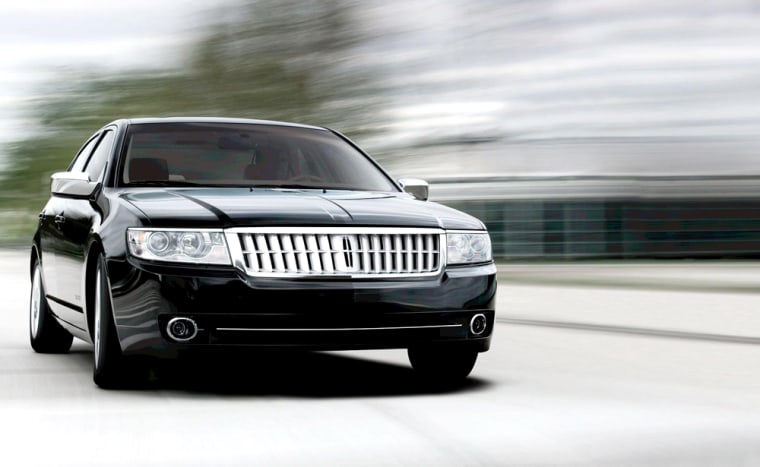Poor reliability, aging designs and supply that exceeds demand are the main culprits for low resale values. The 10 luxury vehicles likely to shed the most value over time each have at least one of those qualities.
The top two value losers on our list, the Lincoln Town Car and Mercury Grand Marquis, which are based on the same Ford platform, have at least two counts against them. Both cars are sold in large numbers to various vehicle fleets, such as limo, taxi and rental agencies, and they use decades-old technology. At least their predicted reliability, as rated by Consumer Reports, has improved in recent years to “average.”
Larry Batton, president and founder of Auto Appraisal Group Inc., says that these two cars “are archaic and don’t fulfill the requirements of modern buyers." The average age of a Lincoln Town Car buyer in 2006 was 69; for a Mercury Grand Marquis buyer it was 67, according to a Ford spokesperson. "That plus the high supply due to heavy fleet use adds up naturally to dismal resale values,” Batton says. He’s referring to the fact that every year the market is flooded with vehicles retired from fleet use, which creates a huge supply that outstrips demand.
The Lincoln Town Car, our list’s top loser, is plagued by another problem: Starting at $45,000 and easily selling for well over $50,000 with options, it’s “dangerously in the price category of some really excellent cars,” Batton says — cars like the BMW 5 Series, Infiniti M35 and Lexus GS. “All are significantly more modern and more appropriate to a wider cross-section of buyers,” Batton says.
Other cars on this list have a similar issue: Their price is too high for the value they offer. The Mercedes-Benz E550 on the list is a good car but seems overpriced at more than $60,000, especially with reliability ratings much lower than those of a competing BMW 5 Series or Lexus ES. Plus, the six-cylinder-powered Mercedes E350 costs $8,500 less than the V8-powered E550. The E350 is a better deal and its residual values show it: Kelley Blue Book projects that the E350 will retain 37 percent of its value after five years and the E550 only 26 percent.
Reliability didn't play as great a role on our previous list of Top 10 Luxury Vehicles with the Highest Resale Value, but it figures prominently into the bottom 10. “Any reliability hiccups or predicted quality issues will likely show up once the car is used, after some wear and tear,” Batton says.
And this has significant implications for those who lease vehicles. “The lease is heavily determined by the residual value,” says Eric Ibara, director of market valuation at Kelley Blue Book. “You’re paying for the depreciation from when you purchase the car to when you return the vehicle. You’ll often get a great deal on vehicles that have a high resale value because the dealer will be able to sell it for more when used.” So vehicles with the lowest residual values are a double-edged sword: They offer the lowest potential return on resale for those who buy and require more money upfront to lease.
It’s important to note that this list isn’t comprised of a bunch of bad cars. Based on our test-drives, the Cadillac STS and Lincoln MKZ that made our value-losers ranking actually perform well. And others on this list are desirable image-wise. The question is, how much are you willing to pay for perceived prestige? For instance, the elegant Jaguar S-Type, with its fragrant leather interior, might instantly appeal to those who always dreamed of owning a Jag; same with the Mercedes-Benz E550.
“Buying a car is an emotional decision, and for some, a snap decision,” Ibara says. “Despite some potential red flags — overly high lease prices, lower quality ratings and bad resale value — people still buy them. But if you’re really interested in getting a good price for the used car, it’s worth it to take time and evaluate all the facts when buying — rather than just go with your gut.”
Another important aspect to keep in mind is that for mainstream vehicles, the longer they are on the market without getting significant updates or redesigns, the more likely residual values will suffer. "It's almost a given that cars near the end of their life cycle — unless they're cultural icons — are going to suffer in the residual value department, simply because they're lagging behind newer designs in technology, comfort and safety features, which in the auto industry are changing fast," says Auto Appraisal Group's Batton.
The Jaguar S-Type and X-Type on this list are good examples of this. The S-Type was first introduced for the 2000 model year and the X-Type for the 2002 model year. Neither vehicle has seen significant updates since their debut, while competing models have been revamped. "Consumers are going to gravitate toward newer, fresher choices.... No amount of 'freshening-up' during a life cycle can make up for a redesign," Batton says.
Our list of the Top 10 Luxury Vehicles with the Lowest Resale Value was compiled using Kelley Blue Book data for new vehicles with manufacturer suggested retail prices (MSRPs) of $30,000 and up, including specific trims of vehicles, not just base MSRPs. The residual values are expressed as a percent of the original MSRP five years into the future. We've put the vehicles in ascending order. Those that tied for a particular ranking are in alphabetical order.
Kelley Blue Book estimates future vehicle values based on a model’s past performance as well as new or notable features. “The best indicator of future performance is past performance,” Ibara says. For newly introduced models, Kelley Blue Book looks to past similar models from a given manufacturer.
